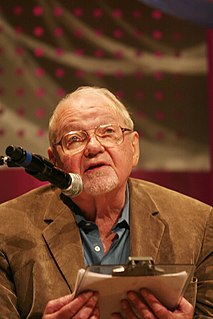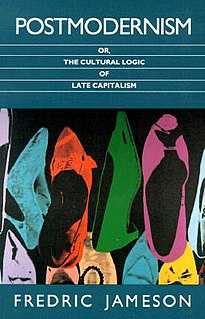Postmodern philosophy is a philosophical movement that arose in the second half of the 20th century as a critical response to assumptions allegedly present in modernist philosophical ideas regarding culture, identity, history, or language that were developed during the 18th-century Enlightenment. Postmodernist thinkers developed concepts like difference, repetition, trace, and hyperreality to subvert "grand narratives", univocity of being, and epistemic certainty. Postmodern philosophy questions the importance of power relationships, personalization, and discourse in the "construction" of truth and world views. Many postmodernists appear to deny that an objective reality exists, and appear to deny that there are objective moral values.
Postmodern music is either simply music of the postmodern era, or music that follows aesthetical and philosophical trends of postmodernism. As the name suggests, the postmodernist movement formed partly in reaction to modernism. Even so, postmodern music still does not primarily define itself in opposition to modernist music; this label is applied instead by critics and theorists.
Postmodernity is the economic or cultural state or condition of society which is said to exist after modernity. Some schools of thought hold that modernity ended in the late 20th century – in the 1980s or early 1990s – and that it was replaced by postmodernity, while others would extend modernity to cover the developments denoted by postmodernity, while some believe that modernity ended after World War II. The idea of the post-modern condition is sometimes characterised as a culture stripped of its capacity to function in any linear or autonomous state like regressive isolationism, as opposed to the progressive mindstate of modernism.

Fredric Jameson is an American literary critic and Marxist political theorist. He is best known for his analysis of contemporary cultural trends, particularly his analysis of postmodernity and capitalism. Jameson's best-known books include Postmodernism, or, The Cultural Logic of Late Capitalism (1991) and The Political Unconscious (1981).

The New York Trilogy is a series of novels by Paul Auster. Originally published sequentially as City of Glass (1985), Ghosts (1986) and The Locked Room (1986), it has since been collected into a single volume.
Postmodern dance is a 20th century concert dance form that came into popularity in the early 1960s. While the term "postmodern" took on a different meaning when used to describe dance, the dance form did take inspiration from the ideologies of the wider Postmodern movement, which "sought to deflate what it saw as overly pretentious and ultimately self-serving modernist views of art and the artist" and was, more generally, a departure from modernist ideals. Lacking stylistic homogeny, Postmodern dance was discerned mainly by its anti-modern dance sentiments rather than by its dance style. The dance form was a reaction to the compositional and presentational constraints of the preceding generation of modern dance, hailing the use of everyday movement as valid performance art and advocating for unconventional methods of dance composition.
Postmodern literature is literature characterized by reliance on narrative techniques such as fragmentation, paradox, and the unreliable narrator; and is often defined as a style or a trend which emerged in the post–World War II era. Postmodern works are seen as a response against dogmatic following of Enlightenment thinking and Modernist approaches to literature.
Cultural pessimism arises with the conviction that the culture of a nation, a civilization, or humanity itself is in a process of irreversible decline. It is a variety of pessimism formulated by a cultural critic.

Postmodern architecture is a style or movement which emerged in the 1960s as a reaction against the austerity, formality, and lack of variety of modern architecture, particularly in the international style advocated by Le Corbusier and Ludwig Mies van der Rohe. The movement was introduced by the architect and urban planner Denise Scott Brown and architectural theorist Robert Venturi in their book Learning from Las Vegas. The style flourished from the 1980s through the 1990s, particularly in the work of Scott Brown & Venturi, Philip Johnson, Charles Moore and Michael Graves. In the late 1990s it divided into a multitude of new tendencies, including high-tech architecture, modern classicism and deconstructivism.
In music, a reprise is the repetition or reiteration of the opening material later in a composition as occurs in the recapitulation of sonata form, though—originally in the 18th century—was simply any repeated section, such as is indicated by beginning and ending repeat signs.
Post-postmodernism is a wide-ranging set of developments in critical theory, philosophy, architecture, art, literature, and culture which are emerging from and reacting to postmodernism. Another similar recent term is metamodernism.
Postmodernist film is a classification for works that articulate the themes and ideas of postmodernism through the medium of cinema. Postmodernist film attempts to subvert the mainstream conventions of narrative structure and characterization, and tests the audience's suspension of disbelief. Typically, such films also break down the cultural divide between high and low art and often upend typical portrayals of gender, race, class, genre, and time with the goal of creating something that does not abide by traditional narrative expression.

Stephen Ronald Craig Hicks is a Canadian-American philosopher. He teaches at Rockford University, where he also directs the Center for Ethics and Entrepreneurship.
Pluralism denotes a diversity of views or stands rather than a single approach or method.
In the visual arts, late modernism encompasses the overall production of most recent art made between the aftermath of World War II and the early years of the 21st century. The terminology often points to similarities between late modernism and post-modernism although there are differences. The predominant term for art produced since the 1950s is contemporary art. Not all art labelled as contemporary art is modernist or post-modern, and the broader term encompasses both artists who continue to work in modern and late modernist traditions, as well as artists who reject modernism for post-modernism or other reasons. Arthur Danto argues explicitly in After the End of Art that contemporaneity was the broader term, and that postmodern objects represent a subsector of the contemporary movement which replaced modernity and modernism, while other notable critics: Hilton Kramer, Robert C. Morgan, Kirk Varnedoe, Jean-François Lyotard and others have argued that postmodern objects are at best relative to modernist works.
Criticisms of postmodernism, while intellectually diverse, share the opinion that it lacks coherence and is hostile to the notion of absolutes, such as truth. Specifically it is held that postmodernism can be meaningless, promotes obscurantism and uses relativism to the extent that it cripples most judgement calls.
Postmodern religion is any type of religion that is influenced by postmodernism and postmodern philosophies. Examples of religions that may be interpreted using postmodern philosophy include Postmodern Christianity, Postmodern Neopaganism, and Postmodern Buddhism. Postmodern religion is not an attempt to banish religion from the public sphere; rather, it is a philosophical approach to religion that critically considers orthodox assumptions. Postmodern religious systems of thought view realities as plural and subjective and dependent on the individual's worldview. Postmodern interpretations of religion acknowledge and value a multiplicity of diverse interpretations of truth, being and ways of seeing. There is a rejection of sharp distinctions and global or dominant metanarratives in postmodern religion and this reflects one of the core principles of postmodern philosophy. A postmodern interpretation of religion emphasises the key point that religious truth is highly individualistic, subjective and resides within the individual.





